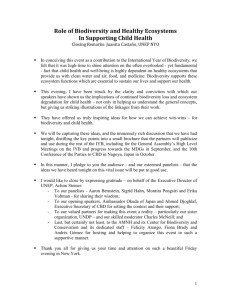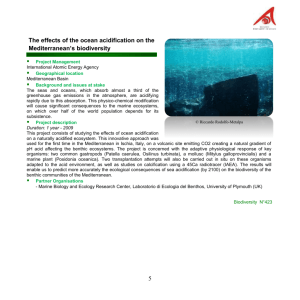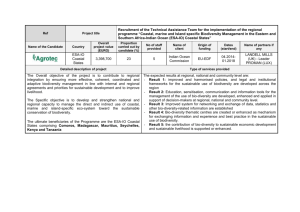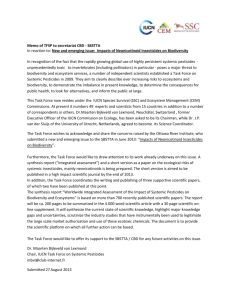Draft recommendation submitted by the Co-Chairs
advertisement
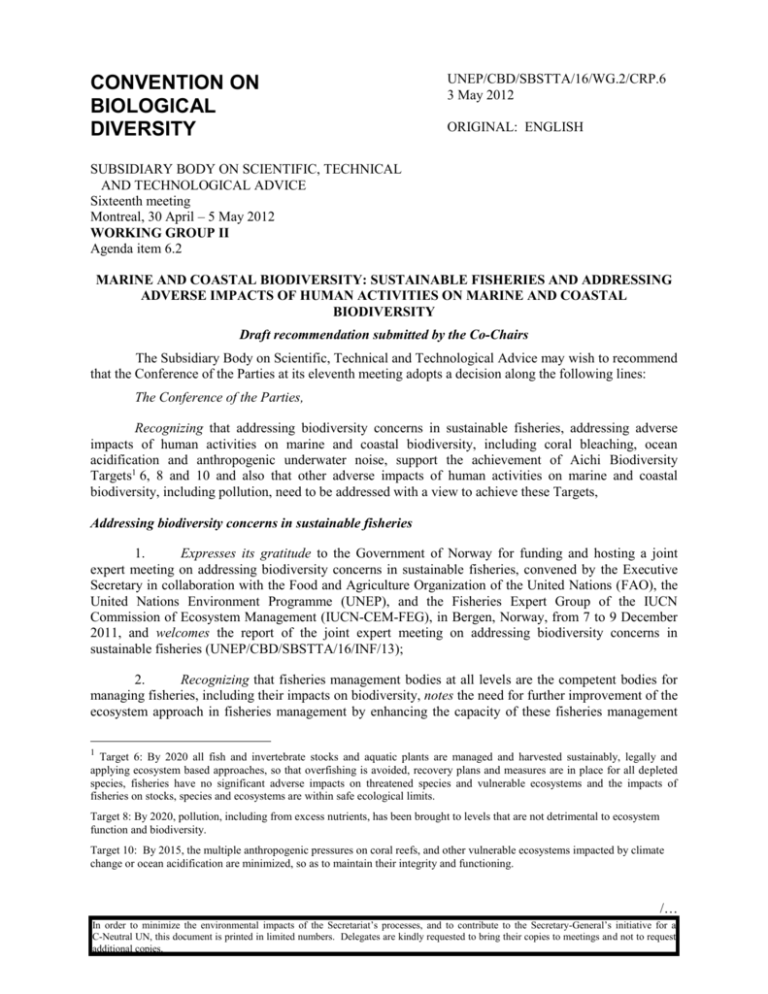
CONVENTION ON BIOLOGICAL DIVERSITY UNEP/CBD/SBSTTA/16/WG.2/CRP.6 3 May 2012 ORIGINAL: ENGLISH SUBSIDIARY BODY ON SCIENTIFIC, TECHNICAL AND TECHNOLOGICAL ADVICE Sixteenth meeting Montreal, 30 April – 5 May 2012 WORKING GROUP II Agenda item 6.2 MARINE AND COASTAL BIODIVERSITY: SUSTAINABLE FISHERIES AND ADDRESSING ADVERSE IMPACTS OF HUMAN ACTIVITIES ON MARINE AND COASTAL BIODIVERSITY Draft recommendation submitted by the Co-Chairs The Subsidiary Body on Scientific, Technical and Technological Advice may wish to recommend that the Conference of the Parties at its eleventh meeting adopts a decision along the following lines: The Conference of the Parties, Recognizing that addressing biodiversity concerns in sustainable fisheries, addressing adverse impacts of human activities on marine and coastal biodiversity, including coral bleaching, ocean acidification and anthropogenic underwater noise, support the achievement of Aichi Biodiversity Targets1 6, 8 and 10 and also that other adverse impacts of human activities on marine and coastal biodiversity, including pollution, need to be addressed with a view to achieve these Targets, Addressing biodiversity concerns in sustainable fisheries 1. Expresses its gratitude to the Government of Norway for funding and hosting a joint expert meeting on addressing biodiversity concerns in sustainable fisheries, convened by the Executive Secretary in collaboration with the Food and Agriculture Organization of the United Nations (FAO), the United Nations Environment Programme (UNEP), and the Fisheries Expert Group of the IUCN Commission of Ecosystem Management (IUCN-CEM-FEG), in Bergen, Norway, from 7 to 9 December 2011, and welcomes the report of the joint expert meeting on addressing biodiversity concerns in sustainable fisheries (UNEP/CBD/SBSTTA/16/INF/13); 2. Recognizing that fisheries management bodies at all levels are the competent bodies for managing fisheries, including their impacts on biodiversity, notes the need for further improvement of the ecosystem approach in fisheries management by enhancing the capacity of these fisheries management 1 Target 6: By 2020 all fish and invertebrate stocks and aquatic plants are managed and harvested sustainably, legally and applying ecosystem based approaches, so that overfishing is avoided, recovery plans and measures are in place for all depleted species, fisheries have no significant adverse impacts on threatened species and vulnerable ecosystems and the impacts of fisheries on stocks, species and ecosystems are within safe ecological limits. Target 8: By 2020, pollution, including from excess nutrients, has been brought to levels that are not detrimental to ecosystem function and biodiversity. Target 10: By 2015, the multiple anthropogenic pressures on coral reefs, and other vulnerable ecosystems impacted by climate change or ocean acidification are minimized, so as to maintain their integrity and functioning. /… In order to minimize the environmental impacts of the Secretariat’s processes, and to contribute to the Secretary-General’s initiative for a C-Neutral UN, this document is printed in limited numbers. Delegates are kindly requested to bring their copies to meetings and not to request additional copies. UNEP/CBD/SBSTTA/16/WG.2/CRP.6 Page 2 agencies, constructive interagency collaboration, and full and meaningful participation of a wide range of experts on biodiversity, relevant indigenous and local communities, and relevant stakeholders, as appropriate, in the fisheries management process; 3. Encourages constructive collaboration between biodiversity and fisheries bodies, and invites fisheries management bodies at national and regional levels in collaboration with the Food and Agriculture Organization of the United Nations (FAO) to ensure that biodiversity considerations are a core part of their work; 4. Requests the Executive Secretary to transmit the report of the joint expert meeting, referred to above, to Parties, other Governments, the Food and Agriculture Organization of the United Nations (FAO) and regional fisheries management bodies, and to collaborate with these bodies with a view to improving how biodiversity concerns are addressed for sustainable fisheries; Progress made in the implementation of the specific work plan on coral bleaching 5. Welcomes the report on the progress made in the implementation of the specific work plan on coral bleaching (appendix 1 to annex I to decision VII/5,) and the barriers to implementation as well as ways to overcome them, including specific actions to mobilize financial resources, as contained in document UNEP/CBD/SBSTTA/16/INF/11, and takes note of the key messages of the report provided in annex I to document UNEP/CBD/SBSTTA/16/6; 6. Notes that progress has been made since the specific work plan was adopted; 7. Recalling Aichi Biodiversity Target 10, expresses its deep concern that climate change will increase the severity and incidence of coral bleaching and ocean acidification throughout tropical seas in the twenty-first century; 8. Also expresses its concern that many recurrent capacity and financial challenges remain, which preclude significant progress in developing countries that still struggle to cope with localized stressors and do not have the capacity or financial resources to fully incorporate climate-change impacts as well as other relevant stressors into coral-reef or coastal-management programmes; 9. Takes note of the urgent need to update the specific workplan on coral bleaching, taking into consideration other global impacts on coral reefs caused by climate change, most notably, projected impacts of ocean acidification, but also the effects of tropical storms and rising sea levels, and recognizes that the projected impacts of ocean acidification need to be integrated into management frameworks alongside the interaction with local stressors; 10. Further notes that meeting the growing challenge of climate-change impacts on coral reefs will require significant investment to increase the capacity for effective management of future bleaching events and other stressors and to scale up the delivery of resilience assessments in all coral-reef regions, and that identifying a range of viable financial mechanisms to achieve these goals is critical; 11. Recognizes the need for managers of coral reef ecosystems: (a) To understand the vulnerability of reef systems to multiple stressors; (b) To plan proactively for climate risks and associated secondary effects, applying ecosystem-based adaptation measures; (c) To manage coral reefs as socio-ecological systems undergoing change predominantly caused by climate modification; /… UNEP/CBD/SBSTTA/16/WG.2/CRP.6 Page 3 (d) To formulate adaptation strategies that aim to enhance the resilience of ecosystems to enable the continued provision of goods and services; 12. Requests the Executive Secretary to incorporate issues concerning the impacts of climate change on coral reefs and their implications for coastal management programmes, including, as appropriate, the elements specified in paragraph 11 above, in regional or subregional capacity-building workshops; 13. Requests the Executive Secretary to collaborate with Parties, other Governments and relevant organizations, including indigenous and local communities, to develop proposals to update the specific work plan on coral bleaching through an addendum to the work plan that addresses the needs set out in paragraph 11 above, and to submit the draft addendum for consideration at a future meeting of the Subsidiary Body prior to the twelfth meeting of the Conference of the Parties; Impacts of anthropogenic underwater noise on marine and coastal biodiversity 14. Welcomes the report on the impacts of anthropogenic underwater noise on marine and coastal biodiversity (UNEP/CBD/SBSTTA/16/INF/12), and takes note of the key messages of the report provided in annex II to the document UNEP/CBD/SBSTTA/16/6; 15. Takes note of resolution 10.24 adopted by the Conference of the Parties to the Convention on Migratory Species at its tenth meeting, which provides guidance on further steps to abate underwater noise pollution, where necessary, for the protection of cetaceans and other migratory species, as well as Resolution 4.18 adopted by the fourth meeting of the Contacting Parties to the Agreement on the Conservation of Cetaceans of the Black Sea, Mediterranean Sea and contiguous Atlantic Area (ACCOBAMS) on the guidelines to address the impact of anthropogenic noise on cetaceans in the ACCOBAMS area; 16. Notes that anthropogenic sound can have both short- and long-term negative consequences for marine animals and other biota in the marine environment, that this issue is predicted to increase in significance over the next few decades, and that uncontrolled increase in anthropogenic noise can add significant further stress to already-stressed oceanic biota; 17. Urges Parties, other Governments and relevant organizations to: (a) Promote research with a view to further improving our understanding of the issue; (b) Promote awareness of the issue with relevant stakeholders both nationally and regionally; (c) Take measures to minimize the significant adverse impacts of anthropogenic underwater noise on marine biodiversity, including, as appropriate, best available technologies (BAT) and best environmental practices (BEP), drawing upon existing guidance; and (d) Develop criteria and indicators for the monitoring of underwater sound; 18. Noting the need for a consistent terminology to describe underwater sound, requests the Executive Secretary to collaborate with Parties, other Governments and relevant organizations, to prepare a draft set of a consistent terminology for consideration by the future meeting of the Subsidiary Body prior to the twelfth meeting of the Conference of the Parties; 19. Noting the gaps and limitations in existing guidance, including the need to update it in the light of improving scientific knowledge, and recognizing a range of complementary initiatives under way, /… UNEP/CBD/SBSTTA/16/WG.2/CRP.6 Page 4 requests the Executive Secretary to collaborate with Parties, other Governments, and relevant competent organizations, including the International Maritime Organization, the Convention on Migratory Species, the International Whaling Commission, as well as relevant indigenous and local communities and other relevant stakeholders to organize an expert workshop with a view to developing practical guidance and toolkits for minimizing and mitigating the significant adverse impacts of anthropogenic underwater noise on marine and coastal biodiversity, which can assist Parties and other Governments in applying necessary management measures. The workshop should cover issues such as the development of acoustic mapping of areas of interest among others; 20. Further requests the Executive Secretary to bring this decision to the attention of the organizations referred to in paragraph 19 above; Progress made in the joint expert review process to monitor and assess the impacts of ocean acidification on marine and coastal biodiversity Recalling paragraphs 63–67 of decision X/29, 21. Expresses its gratitude to the Government of Spain for funding a meeting on the joint expert review process on the impacts of ocean acidification on marine and coastal biodiversity, convened by the Executive Secretary in collaboration with the Intergovernmental Oceanographic Commission of the United Nations Educational, Scientific and Cultural Organization (IOC/UNESCO), in Montreal, on 19-20 October 2011, and welcomes the report of the expert meeting (UNEP/CBD/SBSTTA/16/INF/14); 22. Requests the Executive Secretary to collaborate with IOC/UNESCO, relevant scientific groups and other relevant organizations, including indigenous and local communities, on the preparation of a systematic review document on the impacts of ocean acidification on biodiversity and ecosystem functions, which will provide a targeted synthesis of the biodiversity implications of ocean acidification for marine and coastal systems, including information on the less-reported paleo-oceanographic research, building upon the synthesis provided in CBD Technical Series No. 46, and make it available for consideration by a meeting of the Subsidiary Body prior to the twelfth meeting of the Conference of the Parties, with a view to forward it to Parties, other Governments and relevant organizations and transmit it to the Secretariat of the United Nations Framework Convention on Climate Change (UNFCCC); 23. Takes note of the elements in annex III to the note by the Executive Secretary on addressing adverse impacts of human activities, including coral bleaching, ocean acidification, fisheries and underwater noise (UNEP/CBD/SBSTTA/16/6) as guidance for practical responses to the impacts of ocean acidification on marine and coastal biodiversity, and encourages Parties, other Governments and relevant organizations to make use of this guidance, as appropriate, to reduce various threats from ocean acidification to vulnerable ecosystems and enhance resilience of ecosystems through various area-based or other management measures, in addition to measures to reduce CO2 emissions; Addressing impacts of marine debris on marine and coastal biodiversity 24. Welcomes the preparation by the GEF-STAP of a report on the impacts of marine debris on marine and coastal biodiversity (UNEP/CBD/SBSTTA/16/INF/15), and takes note of the key messages contained in annex IV of the document UNEP/CBD/SBSTTA/16/6; 25. Requests the Executive Secretary in collaboration with Parties, other Governments, and relevant organizations, including relevant indigenous and local communities to: [(a) Organize an expert workshop to prepare practical guidance on preventing and mitigating the significant adverse impacts of marine debris on marine and coastal biodiversity and habitats, which /… UNEP/CBD/SBSTTA/16/WG.2/CRP.6 Page 5 can be applied by Parties and other Governments in their implementation of the programme of work on marine and coastal biodiversity;] (b) To compile and synthesize further scientific information on the impacts of marine debris on marine and coastal biodiversity and habitats; (c) To submit the compilation/synthesis, referred to in subparagraph (b) above, and [the practical guidance, referred to in subparagraph (a) above,] for consideration by a future meeting of the Subsidiary Body prior to the twelfth meeting of the Conference of the Parties; 26. Requests the Executive Secretary, subject to availability of financial resources, to include in regional capacity-building workshops the issue of marine debris in order to discuss ways to prevent and reduce their impacts on biodiversity and strengthen research on the reduction and management of marine debris. -----
